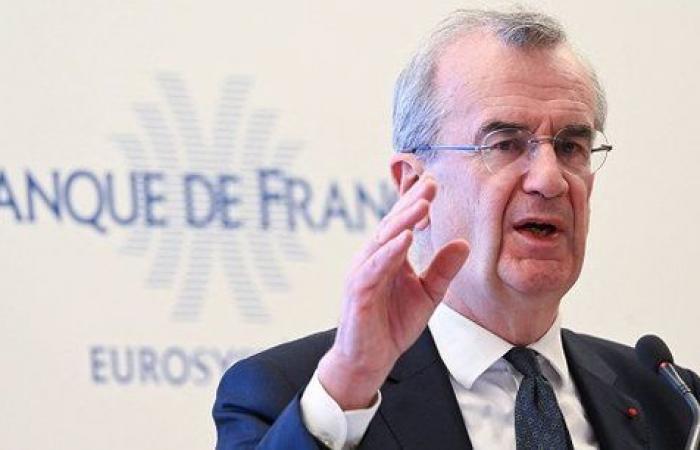
François Villeroy de Galhau warns about “risks for the global economy” after Donald Trump's victory this Wednesday. The governor of the Bank of France stressed the need for “European remobilization”.
“I believe that the result of the American election increases both the risks for the global economy and the need for European remobilization”commented the governor during a conference in Lyon.
A Trump administration will result in “probably more protectionism”, “which means more inflation, at least in the United States, and a priori less growth everywhere in the world”underlined the central banker.
He also noted a likely higher US budget deficit and increased uncertainty, which also risks weighing on growth. “The American election must sound the European awakening” After “a long numbness”commented François Villeroy de Galhau, emphasizing that “Europe is approaching this new situation with obvious weaknesses”whose “technological delay” and the “political division”.
Trump victory: the title of his media group soars
Being “more American”
Tuesday evening, during an event organized by the insurer Axa, he had already called on Europeans to be “more American”that's to say “knowing how to look at our assets and our strengths, and not just our weaknesses”. “We have strengths”he emphasized, listing “our businesses”, “our financial resources” et « nos talents » and deploring the “trend, in our media and political debate (…) to talk infinitely more about our weaknesses” only assets.
Savings constitute in particular “a very strong resource in Europe” but of which “several hundred billion per year” are invested outside the continent, and “widely” in the United States, he said. The opportunity for him to insist on the need to “strengthen the channels between our savings and our investment needs” through a Capital Markets Union (CMU). Such a project, which aims in particular to mobilize the private savings of Europeans in favor of the real economy and thus facilitate investments, has struggled to see the light of day for years within the European Union, due in particular to differences between France and Germany on its terms.
A cost of 533 billion dollars for the EU
The return of Donald Trump to the White House and his protectionist program represent a threat to a global economy, already shaken by several crises. Her first term between 2017 and 2021 had already borne the mark of punitive customs duties. During the campaign, he promised import taxes of notably 60% on Chinese products, and increases of 10% for the rest of the world.
Added to probable retaliatory measures from Beijing and the EU, this would cost the EU economy $533 billion by 2029, $749 billion for the United States and $827 billion for the China, assessed the consulting firm Roland Berger in a study. On the other hand, emerging countries such as India, Indonesia and Brazil “would be much less affected”according to the London School of Economics (LSE).
More broadly, it is the future of international cooperation that is worrying: “the world of multilateralism of the 90s-2000s will no longer exist”judged Tara Varma, visiting researcher at the American think tank Brookings Institution, who anticipates a « violence immense » initiatives of the 47th American president.
With Trump in the White House, Elon Musk reaches a new orbit
8.3 million undocumented workers at risk
Donald Trump's policy risks resulting in a new inflationary outbreak, estimated at more than 4% additional in a dark scenario by the American think tank Peterson Institute (PIIE).
“The issue of immigration is as important as that of international trade” on inflation, underlined Gilles Moec, chief economist of the insurance giant Axa, at a time when the Republican plans to massively expel undocumented immigrants in a country already affected by labor shortages.
The Pew Research Center estimated that 8.3 million undocumented workers could be affected. This would lead to an increase of more than 2 percentage points in inflation in the United States next year, 0.2 point in the euro zone and 0.6 point in China, according to the PIIE. Gilles Moec also warns that this “would slow down the fall in interest rates” initiated by central banks thanks to a lull in inflation, and which was likely to encourage households to consume and businesses to invest.
Risk to global growth
The trade war promised by Donald Trump to China also risks weighing on the dynamics of global growth, driven by Asia and America. Asia currently contributes 60% to this growth but risks being penalized by a worsening of the trade war, warned the International Monetary Fund (IMF).
The United States is one of the only major advanced countries to expect growth above 2% next year, the IMF estimated. But the application of Donald Trump's program risks costing more than 2% per year between 2027 and 2031 to American GDP, estimates the PIIE.
A Trump presidency could reduce global growth by 0.75 percentage points and global trade would be reduced by 3% by the end of the decade, estimates Jamie Thomson, head of macroeconomic scenarios for Oxford Economics. However, he forecasts global growth “a little stronger in 2026 and 2027 (…) the impact of a more flexible US fiscal policy more than offsetting the braking effect of targeted customs measures”.
(With AFP)





